Archive for the ‘onLove’ Category
Thursday, October 9th, 2014
I have a confession to make. . . . Are you listening? Good. Well, here goes…
I’m a packrat.
I can’t help it. Wherever I go I like to take mementoes with me. My best friend calls me the Souvenir Kleptomaniac. If there’s a free gift or college discounts to be had, I’m there. At restaurants I save the little business cards and menus and circle what I ate. I keep receipts from purchases in other countries just because there’s a different language on them. I’m a sucker for nostalgia and remembering my trip in every detail possible is important to me. Although people aren’t generally this extreme, the act of bringing home a keepsake is usually one that people follow. The most important thing about souvenir shopping is getting the most for your money without going bankrupt.
As discussed earlier, sometimes it’s hard to pack everything you need in one suitcase. However, make sure you leave some extra space in it so you have room to bring things back. You don’t want to have to buy an extra piece of luggage to fit everything you want to bring home. Extra luggage means more plane space, means more money out of your pocket.
Be wary of scams.
If you’re going to a country that makes a lot of money off of tourism chances are the people there are waiting for you: and they’re prepared. They want your business and they want you to spend your money on keychains and postcards and bottle openers with funny sayings on them. Don’t feel the need to do your entire souvenir shopping in one day at the same place.

My friend bought a hat from a vendor in China for 25¥ ($5!) that ripped only seconds after purchasing it.
Do not buy souvenirs at the airport.
Those T-shirts that say I HEART [insert country’s name here] aren’t going anywhere. You will see them wherever you go throughout the country, and will probably get a better deal on them in other stores than in the first one you see.
Learn to haggle.
And don’t be ashamed of doing it! The locals want your money, and chances are the initial price they are asking for that miniature sculpture of that famous landmark is a lot higher than they expect you to pay. Haggle with vendors for a better deal. If you are uncomfortable with the asking price—walk away! You’re not obligated to buy anything, and many times walking away will encourage vendors to immediately drop their asking price.

We bought cute panda hats in China that we found a week later for half the price.
Save your money for one priceless gift for yourself.
That’s not to say don’t buy yourself anything else the whole trip. However, study abroad trips leave lasting impressions. Having one precious item to take home from your adventure will mean a lot to you in years to come.

My favorite purchase of the trip: a Jade necklace. It’s very special and something I will treasure forever.
________________________________________________________
–Sam Levitz is a graduate of Brooklyn College and went on the CUNY Study Abroad trip to China the summer of 2013. Follow her on Instagram: slevitz
Follow the Campus Clipper on Twitter and Like us on Facebook!
Interested in more deals for students? Sign up for our bi-weekly newsletter to get the latest in student discounts and promotions and follow our Tumblr and Pinterest. For savings on-the-go, download our printable coupon e-book!
Tags:Cheap, china, deals, haggling, hats, jade, jewelry, keychains, luggage, money, necklace, packing, panda, postcards, savings, shop, shopping, souvenirs, Study Abroad, studying abroad, stuff, suitcase, Travel, Traveling
Posted in Budget Traveler, Friendship, NYC Student Guide, onCollege, onEntertainment, onFun, onLife, onSavings, onShopping, onTravel, onValues, Outside Manhattan, Student Issues, Studying | No Comments »
Monday, October 6th, 2014
Writer and traveler Deborah Cater once said, “You have to taste culture to understand it”—and she wasn’t wrong. When you go to a foreign country and choose to eat only foods you are familiar with then you’re doing yourself a disservice. Traveling is all about trying new things—and food is one of the most important ones. In China, there are so many unique local dishes to try so you shouldn’t let fear of the unknown get in the way of experiencing the country like the locals do.
Sure we’ve all gone to our local Chinese takeout place and have ordered the pork Lo Mein or General Tso Chicken, but if you take the time to explore the country you’ll find non-Americanized Chinese food that’s definitely worth a try.
One of the most popular dishes to try if you find yourself in Beijing is the Peking Duck. This famous dish has been prepared since the imperial era and is served with steamed pancakes and eaten with scallion, cucumber and sweet bean sauce. Traditionally the meat is sliced thin by the cook right in front of you, which is definitely fun to watch. Two of the most notable restaurants are Quanjude and Bianyifang in Beijing, China.
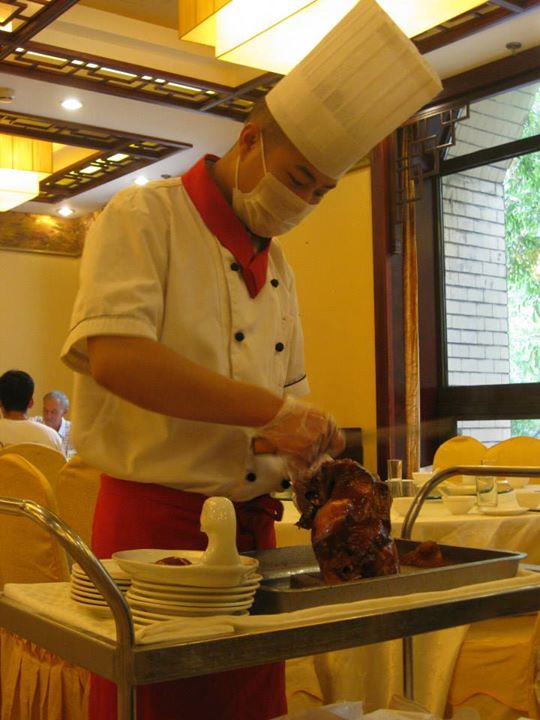
A chef prepares to carve a Peking Duck.
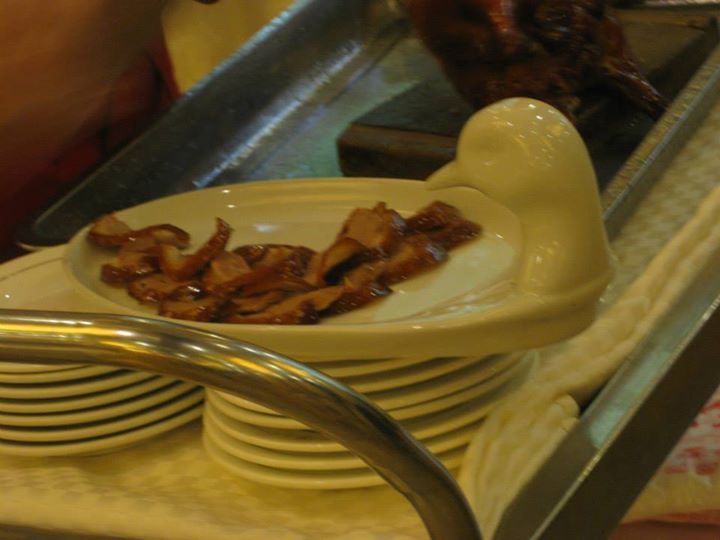
Peking Duck is traditionally served on a duck shaped plate.
We all know that Italy is famous for their pasta; but did you know that the world’s oldest known noodles were actually discovered along the Yellow River in China? Dating back to roughly 4000 years BP, noodles have been a staple food in China—and watching hand pulled noodles being made is definitely something to go see if you visit. Hand pulled noodles, or Lamian, is made by stretching and folding the dough into strands. This unique method of making noodles originated in China and dates back to 1504. Lamian literally means pull or stretch, lā, (拉), noodle, miàn (麵) and watching a professional noodle chef pull noodles is a tourist attraction in itself!
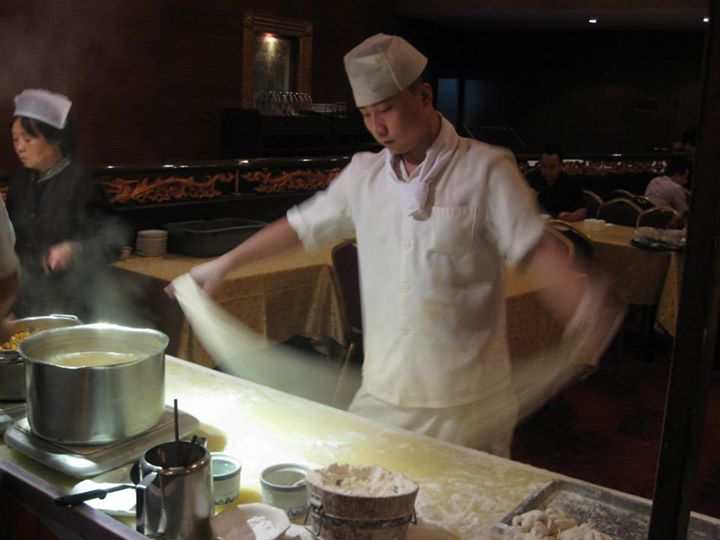
The process of preparing hand pulled noodles is so quick that it happens in a blur!
Whether you’re traveling to China, or any other country, make sure that if you have food allergies you are well prepared. The chefs know what ingredients they use to prepare their food with and a language barrier shouldn’t stop you from being safe. Having a restaurant card is a great way to stay safe, and still be able to enjoy many of the delicious unique foods available. The card clearly states in another language the types of food you are not allowed to eat and your servers and chefs can take it from there.

Gluten-Free restaurant card picture taken from www.chinahighlights.com/
Also, take the time to find out if the water is safe to drink in your country of origin. Often times it’s just easier to choose to drink only bottled water for the duration of your stay. You know it’s clean and safe, and you definitely don’t want to get sick while studying abroad!
________________________________________________________________________________
–Sam Levitz is a graduate of Brooklyn College and went on the CUNY Study Abroad trip to China the summer of 2013. Follow her on Instagram: slevitz
Follow the Campus Clipper on Twitter and Like us on Facebook!
Interested in more deals for students? Sign up for our bi-weekly newsletter to get the latest in student discounts and promotions and follow our Tumblr and Pinterest. For savings on-the-go, download our printable coupon e-book!
Tags:allergies, chicken, china, chinese food, cuisine, cultural, culture, duck, eating, eating abroad, food, food allergies, gluten free, hand pulled noodles, noodles, peking duck, Study Abroad, study abroad program, unique
Posted in Budget Traveler, Cheap Eats, Friendship, NYC Student Guide, onCollege, onEntertainment, onFood, onLife, onLove, onNews, onSavings, onTravel, onValues, Outside Manhattan, Relationships, Restaurant Reviews, Resume Building, Student Issues, Studying | No Comments »
Saturday, September 27th, 2014
When I fantasize about traveling it’s always the same: one neatly packed backpack with just the essentials. Unfortunately, I am not a light packer and so this is never the case. When it comes to studying abroad you want to make sure you’re properly prepared for whatever you may encounter on your trip. It’s never a good idea to assume that a foreign country has exactly what you’re looking for. Try to find college discounts for certain items before your trip and you can save yourself a lot of trouble once you’re there. So what if you’re labeled the “mom” of your trip? Being prepared is never a bad thing—and chances are your new friends will thank you.
Before your trip it’s important to at least attempt to learn the language of the country, or at least learn some key phrases. Rosetta Stone is a great option, but for those of us on a budget there are free smartphone apps readily available. Mindsnacks is a really helpful app I found before my trip to China that allowed me to start learning the language through a series of fun interactive games. If you upgrade to the full version for $5, you’ll get access to 1000 words and phrases, 9 unique games, and 50 lessons to master. This app is available in many different languages and the upgrade is definitely worth the money!

Mindsnacks is a free app that can be used to learn new languages.
Do some research about the weather you’ll experience during the months you’ll be there and pack your clothes accordingly. You don’t want to be the one wearing sweaters in the heat or shorts in the snow. Make sure you have a solid stock of any medicines or vitamins you may take every day. Regular toiletries are an essential and it’s always handy to buy Tide-To-Go, packets of Downy or any other fabric soap just in case you need to do a wash at a moment’s notice.


Sometimes laundry gets expensive in a foreign country.
Check to see what banks are available in the country you’re going to. Many countries often have branches that are linked with Bank of America so if you don’t have an account, open one up. It’s free and you won’t have to pay fees every time you grab some cash from the ATMs. The China Construction Bank, found all over China, doesn’t charge any fees as long as you have a BoA card. You can easily close your BoA account once returning to America.
Other important items are charger adapters for your specific country of origin. The outlets in America are not the same in every country and you do not want to be that person with the hair straightener exploding in your hair!
Also, to stay in touch with family and friends during your trip, set up a Gmail, Skype, Viber, and Whatsapp accounts. These are free ways to connect with your loved ones through email, phone calls, video and text messaging all through WiFi. You don’t want mom to get a $356 dollar phone bill because you accidentally used your data while roaming, do you?
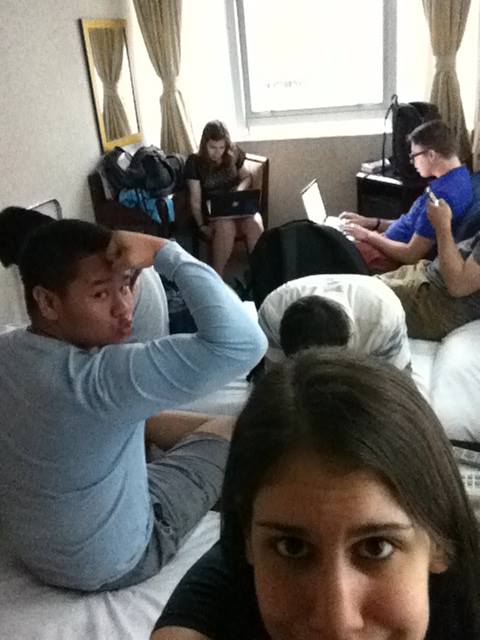
My group connects to the WiFi in our hotel in Hong Kong and immediately engross themselves in social media.
–Sam Levitz is a graduate of Brooklyn College and went on the CUNY Study Abroad trip to China the summer of 2013. Follow her on Instagram: slevitz
Follow the Campus Clipper on Twitter and Like us on Facebook!
Interested in more deals for students? Sign up for our bi-weekly newsletter to get the latest in student discounts and promotions and follow our Tumblr and Pinterest. For savings on-the-go, download our printable coupon e-book!
Tags:apps, atms, bank of america, china, china construction bank, downy, foreign countries, free, gmail, internet, languages, learning, mindsnacks, money, packing, rosetta stone, savings, skype, Study Abroad, study abroad program, studying abroad, suitcase, tide to go, Travel, viber, weather, whatsapp, wifi
Posted in Budget Traveler, Friendship, Housing spaces, NYC Student Guide, onBooks, onCollege, onFun, onHealth, onLife, onSavings, onShopping, onTravel, onValues, Outside Manhattan, Roommates, Student Issues, Studying | No Comments »
Friday, September 19th, 2014
Whether my friends ask me if I want to go to the movies or out for an expensive meal, my answer is always the same: “I’m a college student.” This is the universally known phrase meaning, “I’d love to, but I can’t. I’m broke.” College expenses can really weigh down on my desire to have a social life. Between tuition, books, Metrocard fare, and food, there’s really no wiggle room for anything extra and I’m always trying to find college discounts wherever I go. When I learned about study abroad options through CUNY, my friends asked me where I wanted to go. “China,” I replied smiling. “But I’m a college student.”

Eating a bowl of noodles in Nanjing, China that cost 7¥ (yuan): less than $1.50!
Studying abroad, although costly, is not necessarily as impossible as one might think for the ‘poor’ college student—and it certainly has its perks. One way to help pay for your study abroad trip is to get scholarship money. Just like when you were applying for college, scholarships are diverse, obscure and available to a multitude of people. You just need to be willing to look for them. One great place to start is CEA Scholarships, which are scholarships specifically for students who want to study abroad. There are multiple merit based scholarships available and also financial need based scholarships.
Often times when applying for these scholarships you are required to write a personal essay. In order to get the money you need to make yourself stand out. Write several different essays, share them with your writing major friends, revise, and edit. The more work you put into your essay, the better chance you’ll have at getting that money. Other scholarships to look into for studying abroad are the SIROCS scholarship and the SASA Travel Abroad Scholarship.

You never know when you’re going to stumble upon some interesting souvenir like a Communist Obama Tshirt!
Don’t be afraid to go and contact the financial aid office at your college. Even if you don’t think you qualify for financial aid, go anyway. Sometimes the financial aid rules and regulations differ for certain study abroad programs and it never hurts to ask! Taking out student loans might also be a viable option to look into. Loans are a really great way to give yourself some time to save up your money after you take advantage of this once-in-a-lifetime opportunity.
Start saving up now! Even if you get fully covered by scholarships or financial aid, there’s still the matter of having spending money in a foreign country. Whether you want to buy a cheap bowl of noodles, or a memorable souvenir, you’re going to end up wanting to spend some cash on your trip. In Shenzhen, China I came across an amusement park called Windows of the World. I was definitely glad that I had some cash to pay for the admission. Get a part time job while you wait for the start of your program and put that cash aside. You’ll be happy you did once you get to your new temporary home. You want to be able to take care of yourself while you’re away and have some fun too!

My friends on the train ride at Windows of the World in Shenzhen, China.
–Sam Levitz is a graduate of Brooklyn College and went on the CUNY Study Abroad trip to China the summer of 2013. Follow her on Instagram: slevitz
Follow the Campus Clipper on Twitter and Like us on Facebook!
Interested in more deals for students? Sign up for our bi-weekly newsletter to get the latest in student discounts and promotions and follow our Tumblr and Pinterest. For savings on-the-go, download our printable coupon e-book!
Tags:china, college, college discounts, college savings, financial aid, food, life, living, nanjing, part-time jobs, saving money, scholarships, shenzhen, student loans, Study Abroad, study abroad program, the world, Travel, traveler, travelling, windows of the world, young, your 20s
Posted in Budget Traveler, Friendship, NYC Student Guide, onCollege, onFood, onFun, onLife, onSavings, onTravel, Outside Manhattan, Studying | Comments Closed
Saturday, September 13th, 2014

Photo op with some monks my friends and I met on the Great Wall of China.
I like chicken soup. Wǒ xǐhuān jītāng.
It’s probably one of the only phrases I learned to say correctly in Mandarin while studying abroad in China and it still makes me laugh one year later.
No matter what college you go to, even if it’s only a few psychology courses online, everyone should go on a study abroad program at least once in their lifetime. Study abroad is a rite of passage and the college discounts you get is worth the experience. It’s the ability to say that during your young adult life you did something different and learned about a new place. It doesn’t matter what you do or where you go. What’s important is that you get out, see the world, and learn about a country that isn’t America.
One of the best benefits of studying abroad is that your early 20s is the best time to travel. Besides school, and maybe a part-time job, you don’t have that many obligations. Once you’re working the 9-5 grind you’ll find it’s extremely difficult to snag any vacation days right away. Studying abroad provides you with a way to get college credits without sitting in a classroom for an entire semester. Study abroad programs usually offer a variety of courses that range from common core classes to specific credits that can be used towards your major.
Studying abroad through your school is a great way to make friends that will be there after the trip. Most of the people that go on study abroad trips go to the same school. It’s very easy to form close friendships in a short amount of time on these trips. Walking across campus and seeing a familiar face is always a nice surprise in the middle of a hectic day.

New friendships only grow stronger after hours of hiking the Yellow Mountain (Mt. Huangshan) in the southern Anhui province in eastern China.
People don’t just travel because of the boredom from living in the same place. People travel because they thirst to see something new. It’s one thing to see a picture of a famous landmark; it’s quite another to actually see that landmark with your own eyes. Ask anyone that’s ever traveled anywhere, or ask anyone with a smartphone camera; no photo or Instagram filter can truly ever beat the real thing. When you go home and change your profile picture on Facebook to a picture of yourself standing on the Great Wall of China—that’s something to brag about.
To learn about a culture that is foreign from your own is a truly important experience. There are so many different cultures in the world that it is impossible to count. To go through life ignorant of the world around you is a foolish mistake. Hear a different language slide past your lips. Eat a food that you can’t identify. Engross yourself in a way of living that you’ve never experienced.
A study abroad trip is more than just a trip. It’s a chance to take an adventure, fill a scrapbook with memories, and tell stories to your loved ones that will last a lifetime.
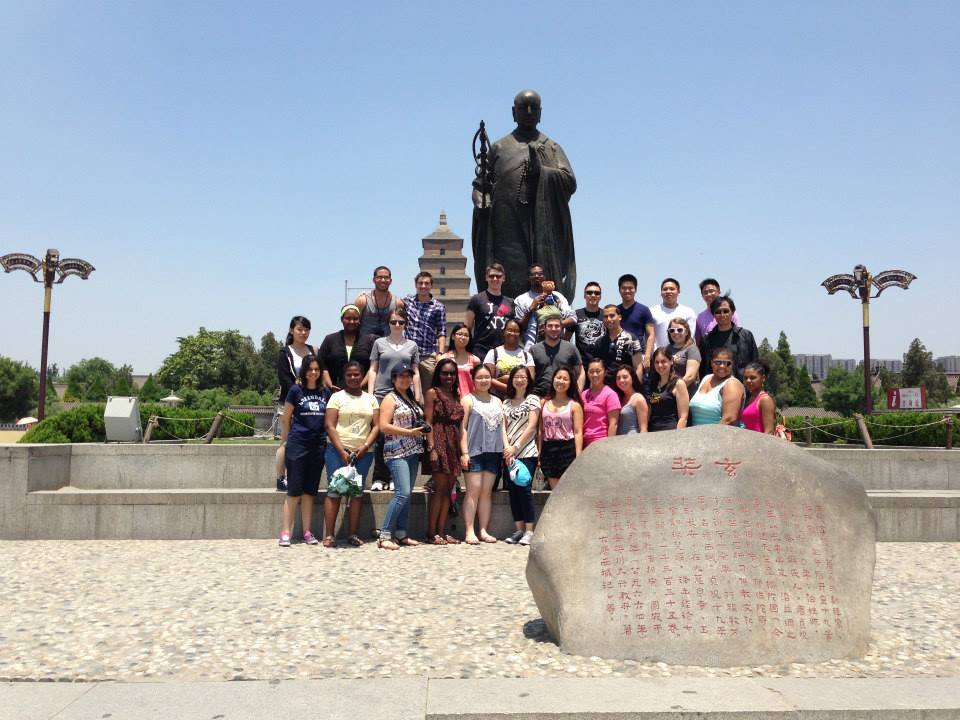
Group picture of the 2013 Summer CUNY China trip in front of the Monk Xuanzang statue in Xi’an, China.
–Sam Levitz is a graduate of Brooklyn College and went on the CUNY Study Abroad trip to China the summer of 2013. Follow her on Instagram: slevitz
Follow the Campus Clipper on Twitter and Like us on Facebook!
Interested in more deals for students? Sign up for our bi-weekly newsletter to get the latest in student discounts and promotions and follow our Tumblr and Pinterest. For savings on-the-go, download our printable coupon e-book!
Tags:20s, BC China, brooklyn college, china, college, college credit, college experience, culture, cuny, financial aid, food, Friendship, great wall of china, Language, photography, plane, sam levitz, scholarships, Study Abroad, Summer, Travel, Traveling, World
Posted in Budget Traveler, Friendship, onTravel, Outside Manhattan, Resume Building, Studying | No Comments »
Friday, February 14th, 2014
By Serrana Gay
“Identity is an individual’s self definition that focuses on enduring characteristics of the self.”
As humans we are constantly asking the question: Who am I? This is a seemingly unanswerable question, yet we spend most of our lives struggling to answer it. We seek to find what it is we think about the world, what resonates with us, and to understand how these things define us.
There are many theories on how identity develops, and while these theories touch on what truly makes us human, they attempt to make it concrete, make it something that science can define. Identity is not something concrete. It is an abstract term we use to try and describe our sense of self.
Despite the fact that “enduring characteristics” are part of the definition of identity, I believe it is constantly in flux. It grows and shifts and morphs, much like an octopus does as it camouflages itself on a Van Gogh painting. Just like the octopus, we adapt to our surroundings, and grow and change as we encounter new stimuli. But who am I then, if I believe this? Will I ever find out? Will I ever know how the way I view myself defines what I do in this world?
One thing that most studies tend to agree on, is that children have a very limited sense of self and begin to form identity based on role models (Carver & Scheier, 1992), and that what we call “identity” begins to form around adolescence. “Before adolescence, individuals are not capable of the cognitive reasoning necessary in establishing identity” (Brogan). Then as we begin growing from children into adults, we start questioning. As we question we begin forming opinions about the world around us, and thus begins the process of defining “who we are”. We observe the world, we take in the things we find useful, we note what moves and inspires us, and we discard the rest. And it is through this long and torturous process that we begin formin what we call identity.
Personally I have noticed that my relationships: romantic, platonic, familial and otherwise have shaped me more than anything else. The ways in which I have chosen and learned to relate to other people has largely affected not only how I behave, but also who I am and how I see myself as a human being in this world.
This and my posts to follow are an examination of the many and varied interactions I have had and the ways in which they have affected the shaping of my identity; as I understand it now, and as it is still changing as I grow. I would love for it to serve as a forum for discussion for others as well. If you would join me in my examination, I would love to hear what you have to say. How you my dear readers identify yourselves, and the ways in which the world and your interactions have shaped you as the humans you are, and are becoming.
Source:
http://www.education.com/reference/article/identity-development/
Posted in onValues, Relationships | No Comments »
Tuesday, February 4th, 2014

By Serrana Gay
Roommates. We all have them, and if you haven’t had one yet, chances are you will at some point. Whether your roommate is your best friend or someone you met a week ago at orientation, living with people is always a challenge.
I have lived with a whole cast of colorful characters: boyfriends, best friends, strangers, and strangers who have become friends. Each relationship has had its ups and downs and each relationship has taught me something different. But time and time again I always come back to the same thing: COMMUNICATION. Without it any relationship is destined to fail.
During my last year of college I fought with my best friend over who was going to vacuum the living room. We didn’t speak for a week. One comment from me led to a dismissal from her, which grew into a text message war, which exploded into a screaming argument and then total silence–endless, dragging silence. Days and days of silence.
Then one day I had an epiphany, a forehead slap moment. The reason we weren’t resolving anything was because we weren’t speaking. We had gotten into a vicious circle of non-communication. Of course, I thought. We were never going to fix anything if we didn’t speak.
That very afternoon I apologized. I told her I was upset because I felt like I was the only one that ever cleaned, and that I realized that I had played a part in making her upset. She said she felt like I was mothering her. We hugged and by the end of the conversation, we were laughing at our own stupidity.
What I took away from this experience is that 1) nine times out of ten, conflicts arise from misunderstanding or things left unsaid, and 2) it is better to confront things head-on than to stay mad.
I know this seems a little too easy, and that sometimes talking about your feelings can be difficult. But take it from someone who knows, without communication all relationships are doomed to fail. As life coach Tony Robbins so aptly puts it, “To effectively communicate we must realize that we are all different in the way we perceive the world and use this understanding as a guide to our communication with others.”
So I put it to you, dear readers, to be the different ones. Take up the challenge and share how you are feeling. Communicate. You will be surprised at how much more easily you will coexist with those you share the world with. And you just might find that the way you treat people will start to shape who you become, the person you are.
Tags:Campus Clipper, college, college life, Communication, conflict, friends, Friendship, Relationships, roommates, student, students
Posted in Friendship, onCollege, onValues, Relationships, Roommates | No Comments »
Saturday, December 14th, 2013
Every student in the depths of depression goes through that particularly steep and lugubrious slump. Honestly, it’s more like a cliff. Full of electric eels and piranhas and alligators, who keep mauling away at any bit of hope you may have left.

"We feed on your misery and despair... and cashews."
What if you could turn those bloodthirsty blues into a pool of rainbows and unicorns? Well, not exactly. But pretty damn close.
All you need is a mantra. Here are the magic words: work within the gravitational field.
Sorry, that’s not a reference to Gravity.

"
But it’s nonetheless solid advice.
There are two minefields we step into when we’re depressed: the future and the past. The latter is relatively simple—you wish you could change something you did. But you can’t. You can’t change the past. Argument over. Talk to me when you step through a wormhole and end up with your thigh attached to your face, or an extra set of eyes under your armpit.

The future—aye, she’s a tricky one. Depending on the way you perceive what is to come, you can either end up in a pool of your own tears and blood (the result of papercuts while crying and leafing through your ex’s photo album, of course), or you can get a fucking grip, grit your teeth, and grin through those horrid weeks.
Ideally, you want to choose the latter. It always ends up a mix of both, though. We simply want to minimize the one where you sink yourself deeper into a pit of self-loathing and pity.
This is where gravity comes in.
Imagine this overly-elaborate and seemingly-unrelated scenario: a newspaper intern is hired for the summer, and he’s doing relatively well—bringing the coffee, unjamming the printer, even writing a little piece for the paper once in a while. But then he does something stupid: he overshoots his mark and decides he wants to be a full time reporter now. Stuck with the notion that he’s too good to be an intern all of a sudden, he stops being speedy with the coffee, the printer remains jammed and the office is lagging because a millennial twat (no offense to 99% of my readers, of course—but I can say it because I’m 22) decided he’s too good for mundane tasks that he was assigned to.
Something similar happens when you overshoot your thought processes. Let’s use subject A’s—Loverboy’s—thoughts as an example: “She never loved me!” Loverboy thinks. And then he shakes his head angrily and retorts, “I never wanted her anyway!” and then it goes back to, “we’re never going to be together again!” and… well, ad nauseam. Despite the only thing that’s corporeal to Loverboy is the shower floor and the empty bottle of vodka, he gets stuck in his head about what might come.
Now imagine he’s working within gravity, within the limits of the day—the limits of his current, veritable environment. In this mindset, the only questions that should float to mind are, “why haven’t I finished showering if it’s 4am already and I went in at midnight?” and “this empty bottle of vodka means I’ve probably drunk texted her several dozen times already and that I’m going to have one shitty morning.”
Loverboy is now working within gravity. The sadness is there but he handles the tasks at hand—turning off the shower nozzle, throwing the empty bottle into the bin and hitting the hay.
If there was no gravity we would float away into space. Unfortunately, our brain has no hemisphere. We float into the clouds and freeze and stagnate and get stuck. That’s why we must create our own gravity and work within it.
Dale Carnegie mentioned to live in day-tight compartments. It’s the same exact principle as working within gravity. Take the day in chunks and don’t overshoot your bounds or you’ll get stuck.
Now, this doesn’t mean you’ll be traveling to that pool of rainbows and unicorns anytime soon, but there will an inherent sense of “I’ll get through this in the near future” as you crunch your teeth between the stream of tears and type that term paper up the day before it’s due.
Au revoir.

———————————————————————————————————
Aleksandr Smechov, Baruch College.
Follow the Campus Clipper on Twitter and Like us on Facebook!
Interested in more deals for students? Sign up for our bi-weekly newsletter to get the latest in student discounts and promotions and follow our Tumblr and Pinterest. For savings on-the-go, download our printable coupon e-book!
Tags:Campus Clipper, college depression, college life, depressed, depression, depression in college, how to battle depression in college, how to be productive, how to stop worrying, overshooting the mark, student depression, what to do when you're depressed
Posted in Friendship, onCollege, onFun, onLife, onLove, onValues, Relationships | No Comments »
Tuesday, September 3rd, 2013
First-time-spa-user here. I’m not really one to make a big fuss over nothing, even crazy college savings, but I have to say– there are certain things you must try in life, and one of them is getting a professional massage. This is a level of pampering that will absolutely erase your bad day, and the Vada Spa employees go well out of their ways to make sure you leave feeling like royalty. I want to take a minute and describe my trip to you. 
Vada Spa, located in downtown Manhattan, is committed to excellent service that is affordable and accessible to anyone. It has two floors: the nail salon on ground level and the hair salon and spa upstairs. When I walked in to make the appointment, I was greeted warmly at the front desk, and was even offered a glass of wine to sip on while I waited for massage. (I mean how classy is that? That’s what I mean when I say they  go the extra mile.) I decided I’d get a manicure before my appointment, so I picked out a pale pink Essie color and took a seat at table right away. The woman who did my nails was extremely thorough when she was prepping them, and very neat with the polish itself. I learned that all of Vada Spa’s employees all had at least five years of experience before coming there, and anyone who’s ever gotten a messy manicure knows that this really makes a huge difference.
go the extra mile.) I decided I’d get a manicure before my appointment, so I picked out a pale pink Essie color and took a seat at table right away. The woman who did my nails was extremely thorough when she was prepping them, and very neat with the polish itself. I learned that all of Vada Spa’s employees all had at least five years of experience before coming there, and anyone who’s ever gotten a messy manicure knows that this really makes a huge difference.
When I was finished drying my nails, it was time to get my massage. My masseuse came to meet me at the front desk. He introduced himself as Tibor and then escorted me to the spa on the second level. It looked as though there were about four or five separate massage rooms on this floor. My room was dimly lit as if by candlelight, and there was soft music playing in the background; it was easy to get comfortable there. The massage itself was one of the most relaxing experiences I’ve ever had, both mentally and physically. It’s funny how you have no idea how tense your muscles are until someone works out all the knots. I’d had backrubs before just from friends, but this is on a completely different level. By the end of it I was so relaxed that I didn’t want to get up– I couldn’t believe an hour had gone by!

This is one experience I’d like to repeat. Those of you who’ve had massages before, you know exactly what I mean! Those who haven’t? Well, you’ll just have to take a trip to Vada Spa!
Check out this college discount before going!

—————————————————————————————————————————-
Laura DeFrancisci, Manhattan College. Check out my Blog!
Follow the Campus Clipper on Twitter and Like us on Facebook!
Interested in more deals for students? Sign up for our bi-weekly newsletter to get the latest in student discounts and promotions and follow our Tumblr and Pinterest. For savings on-the-go, download our printable coupon e-book!
Posted in Family, Friendship, onBeauty, onHealth, onSavings, onShopping, onStyle, onValues, Out On The Town, Uniqueness in NYC | No Comments »
Tuesday, August 27th, 2013
What’s your favorite myth? Maybe something from the Greeks; a cool Herculean feat, Perseus and the Gorgons, the never-ending cycle of jealousy and revenge from Zeus and Hera? Or perhaps something Egyptian, Chinese, Celtic, Slavic? The world of mythology is unendingly vast.
With all of these tales to choose from, my favorite is one created in more modern times—my absolute favorite myth is the myth of the friendzone.

betabeat.com
We’ve all heard it before. Some crusty dude talking about how he was just so nice to this girl, he did everything he could to make her happy, and all she did was friendzone him. Because girls only like d-bags, or girls don’t like boys who are nice to them, or whatever thinly veiled misogynistic crap people are spouting these days.
The friendzone isn’t a real thing. It is a fake concept invented by people who wanted an outlet to ease the pain of rejection; a way for them to say “it wasn’t my fault—I was friendzoned!”
Saying that someone put you in the “friendzone” implies that just because you were nice to them and acted in a FRIENDLY manner, they owe you something. That girl should be in love with you because you let her cry on your shoulder about all of her stupid life problems you hardly even care about! Why doesn’t she want to kiss you on the mouth after all that caring and attention you bestowed upon her?!

How dare she be happy with someone else!
There are so many ugh-worthy things about this I hardly know where to start. For one thing, it’s an incredibly selfish and egocentric way of thinking about your relationships with other people. Expecting something back after doing something nice for someone else kind of flies in the face of what friendship is supposed to be about. You should do things for your friends because it’s enjoyable for you to see the other person happy or to know that they have support during a difficult time. Of course you expect them to do the same for you, but not in the sense that they owe it to you.
For another thing, no girl is obligated to date you just because you were nice to her. Maybe she doesn’t want to date you because, oh, I don’t know, she just doesn’t want to date you? Because she’s not attracted to you in a romantic way? Because she’s with someone else or is trying to be with someone else? There could be a million different reasons, and it doesn’t really matter which it is. She just doesn’t want to date you. Maybe if you stopped focusing on the rejection and just moved on with your life, you’d be able to find someone who does value you in a romantic way.
Please, for the love of god, just stop talking about the friendzone. It’s about as real as Lord Voldemort and just as damaging to humankind.
—————————————————————————————————————
Alex Ritter, NYU.
Follow the Campus Clipper on Twitter and Like us on Facebook!
Interested in more deals for students? Sign up for our bi-weekly newsletter to get the latest in student discounts and promotions and follow our Tumblr and Pinterest. For savings on-the-go, download our printable coupon e-book!
Tags:Friendship, friendzone, Relationships
Posted in Friendship, onLove, Relationships | No Comments »

























 go the extra mile.) I decided I’d get a manicure before my appointment, so I picked out a pale pink Essie color and took a seat at table right away. The woman who did my nails was extremely thorough when she was prepping them, and very neat with the polish itself. I learned that all of Vada Spa’s employees all had at least five years of experience before coming there, and anyone who’s ever gotten a messy manicure knows that this really makes a huge difference.
go the extra mile.) I decided I’d get a manicure before my appointment, so I picked out a pale pink Essie color and took a seat at table right away. The woman who did my nails was extremely thorough when she was prepping them, and very neat with the polish itself. I learned that all of Vada Spa’s employees all had at least five years of experience before coming there, and anyone who’s ever gotten a messy manicure knows that this really makes a huge difference.


